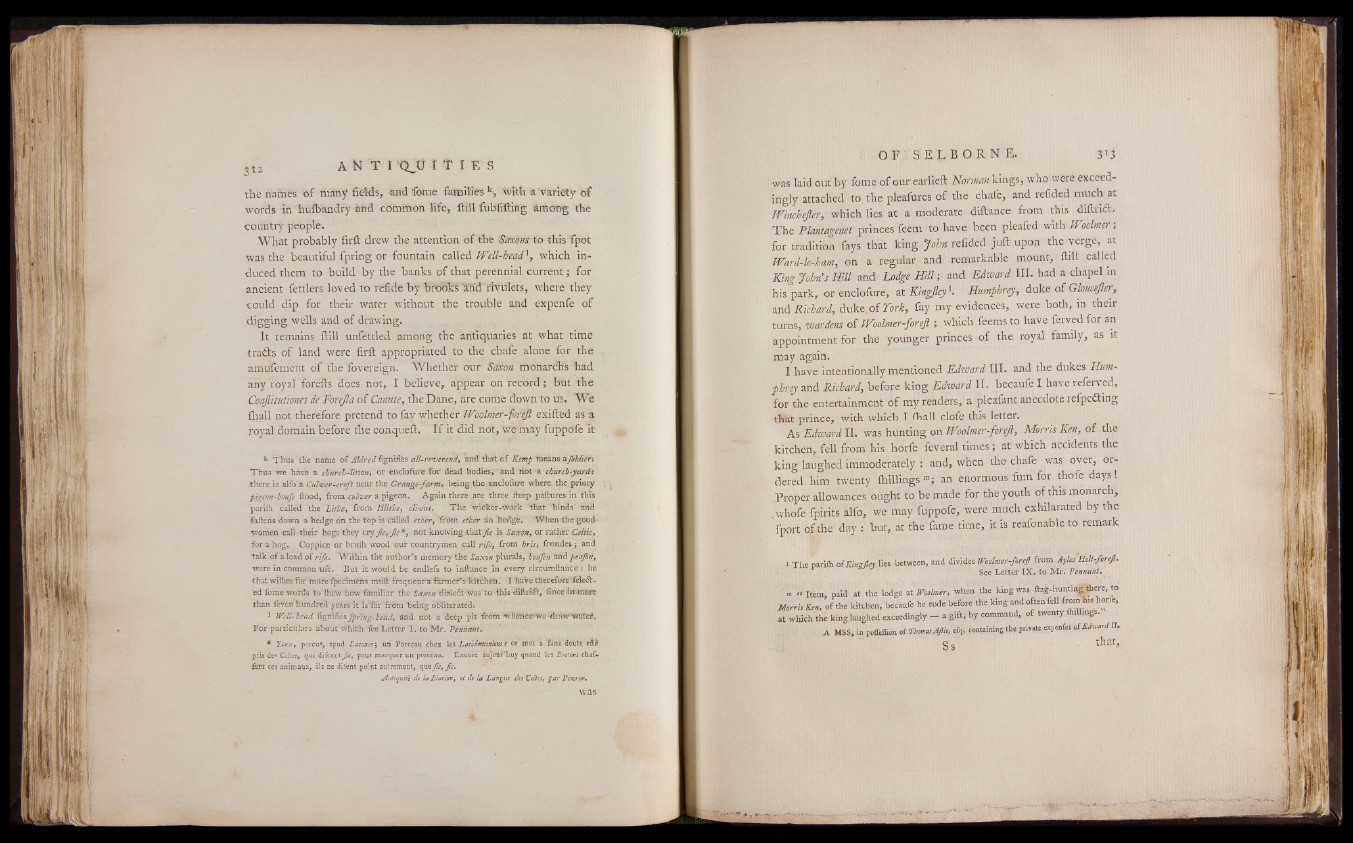
the riatoes 6f many fields, and feme families k, with a'variety o f
words in bufbandry and common life, ftill fubfifting among the
country people.
What probably firft drew the attention of the Saxons to this fpot
■ was the beautiful fpring or fountain called Well-head which in»
duced them to build by the banks of that perennial current ; for
ancient fettlers loved to rëfide by broSKs 'Sh'd rivulets, where they
could dip for their water without the trouble and expenfe of
digging wells and of drawing.
It remains ftill unfettled among the antiquaries at what time
crafts of land were firft appropriated to the chafe alone for the
amufement of the "fovereign. Whether our SetXOn moharcbs had
any royal forefis does not, I believe, appear on record ; but the
ConJUtutiones de Forçfta 6f Canute, the Dane, are come down to us. We
fhall not therefore pretend to fay whether Woolmer-forejl exiftëd as a
royal domain before tile conqueft. If it did not, we may fuppdfe it
k Thus the nafne bf Aîdred fignififes all-revetefrd, and that of Kemp riieans zfiddién
Thus we have a cburcb-litton, or enclofure for dead bodies, and riot a churcb-yardt
there is alfo a Culver-croft near the Grange-farm, being the-enclofure where, the priory
pigeon-houfe ftôod-, from culver a pigeon. Again there are three fteep pallures in this
parifli called the Lithe, from Hlithe, clivus. The wieker-Wbrk ‘that binds' and
fallens down a hedge on the top is called ether, from ether an hedge. When the good-
women call their hogs they cry f ie - f ie * , not knowing t ha t i s Saxon, or rather Celtic,
for a hog. Coppice or brulh wood out countrymen call rife, from bris, frondes j and
talk of a load of rife. Within the author’s memory th e Saxon plurals, boufen àrid peajb’n,
were in common ufe. But it would be èndlefs to inftance in every circumftance : hé
that wîlhes for mOre fpecimens mull ffequent‘a •farmef’s%itchen.' I have thereforeTeleél-
ed fome words to îhëW hcfw'familiar the Sàxon dialed! Was to f his diftridl, linceiiri-more
than fevèn hund'réd ÿëârs it is'far from being Obliterated*
1 Well-bead figriifiësf f fing-head, and not a deep pit 'from whériée,we;drflw"watet.
For particulars about1 Which fee Letter I. to Mr. Pennant.
* Eisia , porcus, apud Lacones -, un Porceau chez les Lacédémoniens s ce mot a ‘fans'doute eftè
pris de« Celtes, qui difeentfie, pour marquer un porceau. Encore àujoùrhuy quand les Bretons chaf-
fent ces animaux, ils ne diient point autrement, que fie , fie.
Antiquité de la Nation, et de la Langue des Celtes, par Pezron.
was laid out by fome of our earlieft Norman kings, who were exceedingly
attached to the pleafures of the chafe, and refided much at
Winchejler, which lies at a moderate diftance from this diftridt.
The Plantagenet princes feem to have been pleafed with Woolmer;
for tradition fays that king John refided juft upon the verge, at
Ward-le-ham, on a regular and remarkable mount, ftill called
King John’s Hill and Lodge H ill; and Edward III. had a chapel in
his park, or enclofure, at Kingjley'. Humphrey, duke of Gloucejler,
and Richard, duke.of York, fay my evidences, were both, in their
turns, wardens of Woolmer-forejl ; which feems to have ferved for an
appointment for the younger princes of the royal family, as it
may again.
I have intentionally mentioned Edward III. and the dukes Humphrey
and Richard, before king Edward II. becaufe I have referved,
for the entertainment of my readers, a pleafant anecdote refpedting
thht prince, with which I fhall clofe this letter.
As Edward II. was hunting on Wwlmer-forejl, Morris Ken, of the
kitchen, fell from his horfe feveral times; at which accidents the
king laughed immoderately : and, when th& chafe was over, ordered
him twenty {hillings m; an enormous fum for thofe days!
Proper allowances ought to be made for the youth of this monarch,
whofe fpirits alfo, we may fuppofe, were much exhilarated by the
fport of the day : but, at the fame time, it is reafonable to remark
i The parifli of Kingjley lies between, and divides Woolmer-forejt from Ayles Holt-foreft.
See Letter IX. to Mr. Pennant.
« “ Item, paid at the lodge at Woolmer, when the king was ftag-huntingjhere, to
Morris Ken, of the kitchen, becaufe he rode before the king and often fell from ins horfe,
at which the king laughed exceedingly - a gift, by command, of twenty flullings.
A MSS. in poffeffion of TbmaSAJ>l','(l- contabuns the private expenfes of Bd-ward II.